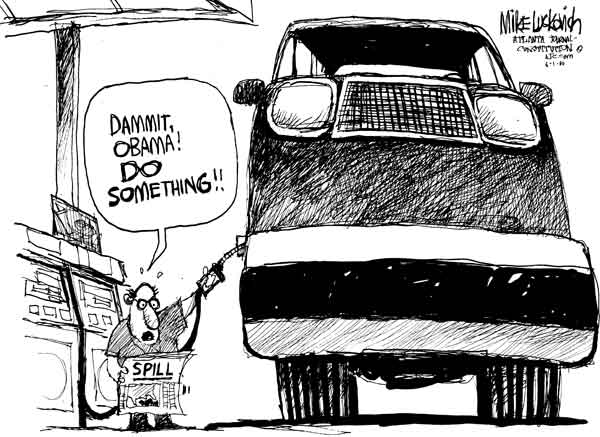
Image Credit: Mike Luckovich
I’m sorry, but the irony is just too thick these days. We Americans are rightly upset with BP for the devastating spill in the Gulf that is wreaking ecological devastation on a mammoth scale. But as I watch the television news and read the daily coverage, I’m not hearing enough outrage at our petroleum-dependent lifestyles and the gas-guzzling vehicles we hop into at a moment’s notice to drive to the store for a pint of ice cream. We need to hold a mirror up to ourselves at those protest rallies.
Oil spills are tragic on multiple levels: to the affected ecosystems; to those who depend on the region’s bounty for their livelihoods; to the tourism industry in the region; and even to employees at the oil companies and public agencies whom we have to assume are trying hard to do the right thing. Residents of the Gulf Coast and ecosystems are being — or will soon be — devastated by the spill that continues to hemorrhage tens of thousands of barrels of oil into the Gulf daily. We must redouble efforts to protect coastal wetlands while workers with their undersea robotic vehicles continue trying to stem the leak. And we certainly should hold the companies that caused the leak liable for the costs of cleanup, as well as for the economic damage both the oil and its cleanup are causing. Those impacts will likely be measurable for years, if not decades.
But at the same time, we too — consumers of the oil and gas we are going to ever-greater effort to harvest — must share some of that blame. Every once in a while we are reminded in a very dramatic way of the larger impacts of our profligate consumption of oil. The Santa Barbara oil spill in January 1969 spilled 200,000 gallons of crude oil, despoiling a 35-mile stretch of the California coastline and resulting in a ban on offshore drilling. Twenty years later in March, 1989, the Exxon Valdez oil tanker spilled 10.8 million gallons of crude oil, ravaging the rich biodiversity along a 1,300-mile span of Prince William Sound coastline and leading to tighter regulations on shipping oil, including the requirement for double hulls in the oil tankers that haul billions of gallons of oil around the world each year.
Now, after two more decades, another oil spill is dominating the news. As with the other two described, this one is far larger than the previous one. By government estimates, the BP spill has already spewed 22-35 million gallons (at least twice as much oil as the Exxon Valdez), and some experts say the rate of flow from the disabled blowout valve is significantly greater. While progress appears to have been made in capturing some of the gushing oil, we are told that it will be months before the well is permanently capped and the spill fully contained.
These spills are horrible, of course, but so too are the spills that occur when the oil pans in our cars drip oil. Each year in the U.S. roughly 180 million gallons of motor oil is either dumped down the drain during oil changes or is leaked from engine crankcases, according to the Massachusetts Department of Environmental Protection. The few drops of gasoline that most of us spill each time we fuel up our cars add up to hundreds of thousands of gallons per year nationally. Leaks from our outboard motors leave that familiar iridescent sheen on the water. The lubricating oil we use in our chainsaws is deposited directly onto the ground as we cut our cordwood (as it’s intended to do). These smaller incremental leaks each year add up to many times as much oil contamination as the BP spill to date.
This is not at all meant to trivialize the BP spill, but rather to point out the significance of oil spills that we consumers can do something about. We can repair our cars so that they don’t drip motor oil. We can be more careful when fueling up. We can use biobased lubricating oil for chainsaws. And, of course, we can use less energy—by driving less and better insulating our houses.
If we’re serious about our anger at the BP oil spill in the Gulf, we should direct a large share of that anger at our own consumption of petroleum in our cars and our homes. As Pogo said in Walt Kelly’s famous comic strip: “We have met the enemy and he is us.”
Interested in your thoughts.
Alex Wilson is the executive editor of Environmental Building News and founder of BuildingGreen, LLC. To keep up with his latest articles and musings, you can sign up for his Twitter feeds.
Weekly Newsletter
Get building science and energy efficiency advice, plus special offers, in your inbox.





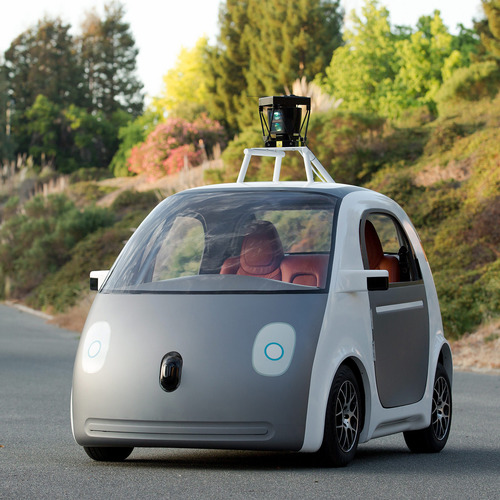
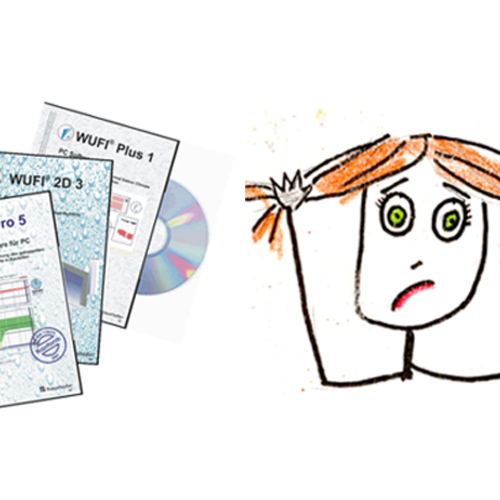
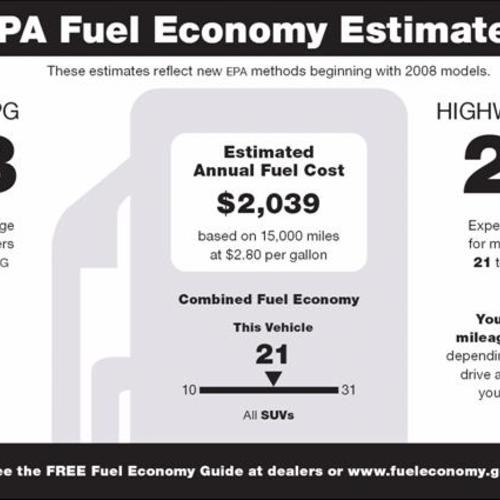
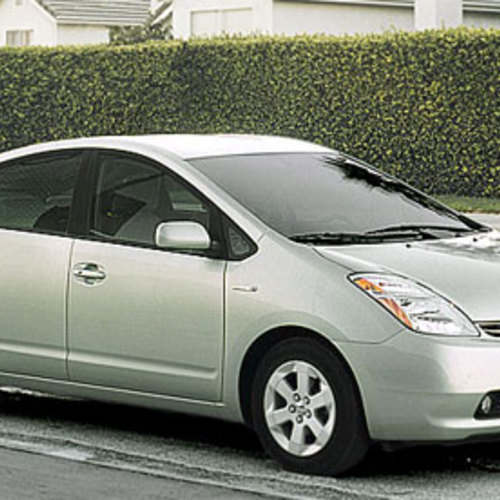






9 Comments
Gulf of Mexico is just the beginnning
What is happening in the Gulf of Mexico is horrible. But let us not lose sight of the fact that far worse is regularly inflicted on the people and ecosystems of disadvantaged countries, for example Nigeria (http://tinyurl.com/3a3by6m), as the developed world feeds its endless appetite for energy.
Seriously time to go green as our new "toy" to want...
Nothing like wanting... and needing... we need to go green... net zero etc. I think we will get there just in time like we always do. Capitalism... Moore's law in action and before you know it, we will have unlimited technology available and in use to get us into the next revolution after the industrial age... We are entering the Man/God age... with all the possibilities of genetic and nano scale engineering. Just like always... some of the knowledge will be useful and some will open new doors to mass destruction... you know... nuclear power stations... and nuclear bombs strapped to suicide bombers.
What a dynamic fun world to live in!
Go humans!
and if not... yeah universe! It will always win in the long run.... such a big turtle.
Maybe hypocrisy is a better word...
Great article, Alex. I don't watch much TV news, but I saw some on CNN yesterday and have seen the outrage about the spill growing, especially with politicians trying to make political gains from it. Just another reminder of why I mostly avoid mainstream news.
As someone who grew up in south Louisiana, though, I can tell you that the oil industry has been destroying the wetlands for over half a century. The places where I used to walk around on strips of land in the marsh are underwater now. Lake Boudreaux has grown larger and saltier. In places where I used to fish for bass, my friends now catch redfish.
I just wrote about this yesterday in my blog, in an article titled, The REAL Tragedy of the Oil Industry in Louisiana. You can read it at:
http://hub.am/dgtyIA
Great Post Alex. You are
Great Post Alex. You are absolutely right about the fact that we as a people share responsibility for this spill. We failed to listen when we were warned about the potential for catastrophe from offshore drilling by the scientific community. We have failed to listen for 60 plus years as scientists have warned us of impending Climate Change from our toxic addiction to fossil fuels and the pollution that comes from it. We have been comfortably numb for the last 45 years and ignored our ever increasing thirst for oil and energy. The Hummer and the rest of the gas guzzling SUV's are physical monuments to our carelessness and disposable attitude in reference to our wasteful usage of oil. Many people forgot about the Exxon Valdez , which will represent the likes of an oil change compared to the magnitude of this disaster. I am personally enraged and saddened by the countless wildlife affected, because they did not get a choice in this matter, yet they suffer monumental casualties. It will be decades before the ecosystem recovers , if it ever does. Your suggestions as to how we as individuals can help are useful if we put them into practice. If we continue the apathy and indifference that has allowed Big Oil, Coal and Gas to rape our living environment, and destroy our ecosystems and critical habitat while chasing their massive profits, then we have not learned anything. Companies Like BP are only concerned with one thing, their precious oil, and satisfying the profit margin. The wanton negligence that caused this disaster will happen again without making them accountable. The British and US government should take over control of the operation. They should seize the assets of the company, prevent them from doing business, and use the assets to clean up the Gulf and the coastline. Compensation for the people should be of primary importance. We have stood by and watched as BP stalled in order to salvage their precious oil, lied about the magnitude of the spill, failed to compensate those whose lives and livelihoods have been destroyed, and sprayed toxic dispersants into a marine ecosystem already devastated by their blunders. When will it end??
Step away from the edge....
Mr. Palma, the world isn't being raped or pillaged or plundered. The sky isn't falling. The world isn't coming to an immediate end; I'm happy for you that you have such an abundance of good things going on in your life that you're able to seek out something negative.
Stewardship is the implementation of actions that are positive and negative and the use of resources. Proper stewardship is balancing the good outcomes and the bad repercussions in an ethical way for the highest and best use of society, in both the long- and short-term. Not using resources is poor stewardship, worse than over-using resources. Yes, we can do a better job but doing so to the detriment of society is the opposite of progress. The vast differences in how those in society use their brain as a resource is one of the things that makes life interesting, and for that I commend you.
Now, on to the specific topic at hand. I drive a 1995 Suburban as my "work truck". I do so because I need the space and hauling capacity of it at times and because I fit in it comfortably (I'm 6'5"). It gets 10-14 mpg and passes South East Wisconsin's strict emissions with flying colors. I'd LOVE to purchase a diesel Expedition but that would be a poor use of my, and the world's, resources; I contend that I am being a better steward by maintaining what I have instead of purchasing one that uses less fuel and/or emits less emissions, let alone purchasing another vehicle to use when I do not need the Suburban (not counting my wife's car).
I'm not looking to get into an argument or debate over this, just pointing out that as with every thing else in life there are more than two ways of looking at something. Recognising and understanding the other ways is thought on the highest order. I encourage thought, no matter the outcome....
Gulf oil
We should stop using the term "spill". This is not a spill; this is a gusher.
Thanks
Alex -- great post as usual. I always appreciate being reminded that we need to do more than talk or get upset -- we need to act. I can and need to do more. Thanks for that.
Water and Oil
For me the perfect irony is watching the news reports of meetings where the topic is reducing our nation's dependence on oil. All the while everyone sitting around the table has a plastic bottle filled with water and plastic cup to pour it into.
Too right.
Couldn't agree more. Not surprisingly though, despite being slapped in the face by one of the most important issues facing our species, we by and large fail to make the real connection.
Log in or create an account to post a comment.
Sign up Log in